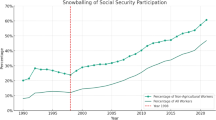Abstract
Congressional consideration of the North American Free Trade Agreement (NAFTA) in 1993 drew intense labor lobbying. Unions acted to motivate members to contact their representatives and senators, including use of their magazines as advocacy and informational tools. Union magazines, which are littlestudied but potentially influential advocacy tools, attacked the pact and urged readers to take political action. Their coverage focused on jobrelated critiques, especially predictions of a job drain to Mexico and lower wages for U.S. workers. Much less attention went to environmental and other perceived flaws of NAFTA. Language in those articles was frequently more heated than in the mainstream media.
Similar content being viewed by others
References
American Newspaper Guild, Labor Press Committee. “The Labor Paper: Powerful Arm of the Union Movement, But Far Too Little Used.” New York: AMG, 1939.
Cole, Gordon H., Leon Stein, and Norman L. Sobol. Labor's Story As Reported by the American Labor Press. Glen Cove, N.Y.: Community Publishers, 1961.
Conybeare, John A. and Mark Zinkula. “Who Voted against NAFTA? Trade Unions versus Free Trade.” World Economy (January 1996): 1-2.
Dorgan, Byron L. “The NAFTA Debate That Never Was.” Columbia Journalism Review 32 (January 1994): 47–49.
Duram, James C. “The Labor Union Journals and the Constitutional Issues of the New Deal: The Case for Court Restriction.” Labor History 14 (Spring 1974): 216–38.
Fico, Fred and William Cote. “Fairness and Balance in the Structural Characteristics of Newspaper Stories on the 1996 Presidential Election.” Journalism & Mass Communication Quarterly 76 (Spring 1999): 124–37.
Fones-Wolf, Elizabeth. “Promoting a Labor Perspective in the American Mass Media: Unions and Radio in the CIO Era, 1936-56.” Media, Culture and Society 22 (May 2000): 285–307.
Freedman, Eric. “Basic Coverage: Bringing Labor Issues into the Journalism Classroom.” Metro Detroit Labor News 15 (March 2000): 8.
Gai, Zheya. “The Politics of NAFTA: The Decision-Making of the Undecided Members in the United States House of Representatives.” Ph.D. Dissertation, University of Pittsburgh, 1997.
Garver, Richard A. “The Labor Press As a Leadership Tool.” Journalism Quarterly 35 (Summer 1958): 324–32.
Goss, Brian Michael. “‘All Our Kids Get Better Jobs Tomorrow’: The North American Free Trade Agreement in the New York Times.” Journalism Communication Monographs 3 (Spring 2001): 5–47.
Guimary, Donald L. “Strike Born Newspapers.” Journalism Quarterly 46 (Autumn 1969): 594–97.
Hoyt, Michael. “Is the Labor Press Doing Its Job?” Columbia Journalism Review 22 (July–August 1983): 34–38.
Industry Week. “Do You Read the Union Newspaper?“ (April 7, 1975): 32-34.
International Association of Machinists & Aerospace Workers. The Machinist. Washington: D.C., September 1992 to January 1994.
Kahane, Leo H. “Congressional Voting Patterns on NAFTA: An Empirical Analysis.” American Journal of Economics and Sociology 55 (October 1996): 395–409.
Lyons, Schley R. “The Labor Press and Its Audience: The Case of the Toledo Union Journal.” Journalism Quarterly 46 (Autumn 1969): 558–64.
Mencher, Melvin. News Reporting and Writing. New York: McGraw Hill Higher Education, 2000.
Nichols, Bill. “Clinton Blasts Unions on Pact.” USA Today, November 8, 1993.
Nichols, John. “Newspapers Are Increasingly Out of Step with Readers.” The Masthead 51 (Winter 1999): 13–14.
Perline, Martin M. “The Trade Union Press: An Historical Analysis.” Labor History 10 (Winter 1969): 107–14.
Pizzigati, Sam and Fred J. Solowey. The New Labor Press: Journalism for a Changing Union Movement. Ithaca, N.Y.: ILR Press, 1992.
Raymond, Chris Anne. “Uncovering Ideology: Occupational Health in the Mainstream and Advocacy Press, 1970–1982.” Ph.D. Dissertation, Cornell University, 1983.
Schor, Manny N. “Labor Press Functions and Reader Preferences.” Journalism Quarterly 26 (March 1949): 75–77.
Smith, R. Blake. “Labor Secures Its Role within NAFTA.” Occupational Safety and Health 63 (October 1994): 37–49.
Steagall, Jeffrey W. and Ken Jennings. “Unions, PAC contributions and the NAFTA Vote.” Journal of Labor Research 17 (Summer 1996): 515–33.
Stempel, Guido H. III. “Oh, Canada!” Bulletin of the American Society of Newspaper Editors 759 (June 1994): 34–35.
Streitmatter, Rodger. “Origins of the American Labor Press.” Journalism History 25 (Autumn 1999): 99–106.
United Auto Workers. Solidarity. Detroit: UAW, October 1992 to January 1994 and October 1999–September 2000.
United Brotherhood of Carpenters & Joiners of America. Carpenter. Washington, D.C., UBC, July-August 1992 to Janua–February 1994.
United Food and Commercial Workers. UFCW Action. Washington, D.C.: UFCW, March–April 1992 to January–February 1994.
Author information
Authors and Affiliations
Rights and permissions
About this article
Cite this article
Freedman, E. Union magazines’ coverage of the NAFTA controversy before congressional approval. J Labor Res 25, 301–313 (2004). https://doi.org/10.1007/s12122-004-1038-1
Issue Date:
DOI: https://doi.org/10.1007/s12122-004-1038-1




